
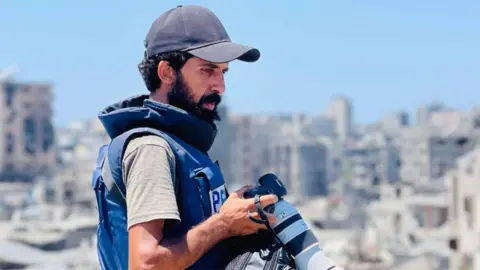 BBC
BBCFacebook imposed severe restrictions on Palestinian media's ability to reach audiences during the war between Israel and Gaza, according to BBC research.
In a comprehensive analysis of Facebook data, we found that newsrooms in the Palestinian territories – in Gaza and the West Bank – have suffered a sharp decline in audience engagement since October 2023.
The BBC also saw leaked documents showing that Instagram – another platform owned by Meta – increased its moderation of Palestinian users' comments after October 2023.
Meta, the owner of Facebook, says that any suggestion that it deliberately suppresses certain voices is “unequivocally false.”
Since the beginning of the war between Israel and Gaza, only a small number of outside correspondents have been allowed to enter the Palestinian coastal area of Gaza from the outside, and they have been able to do so only accompanied by the Israeli military.
Social media has filled the gap for those who want to hear more voices from inside Gaza. The Facebook pages of media outlets such as Palestine TV, Wafa News Agency, and the Palestinian newspaper Al-Watan – which operate outside the West Bank – have become a vital source of updates for many around the world.
BBC News Arabic compiled data on engagement on the Facebook pages of 20 prominent Palestinian news organizations in the year before Hamas' attacks on Israel on October 7, and in the year after.
Engagement is a key measure of how influential a social media account is and how many people are viewing its content. It includes factors such as the number of comments, reactions and shares.
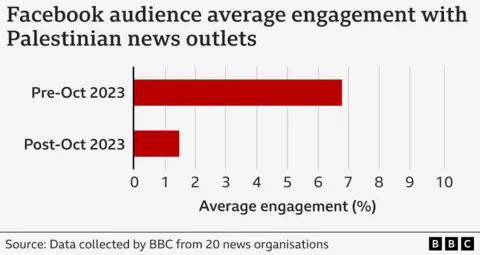
During a period of war, it might be expected that audience engagement would rise. But the data showed a decline of 77% after the Hamas attacks on October 7, 2023.
Palestine TV has 5.8 million followers on Facebook. Journalists in the newsroom shared statistics with us showing a 60% drop in the number of people viewing their posts.
“Interaction has been completely restricted, and our publications have stopped reaching people,” says Tariq Ziad, a journalist at the channel.
Over the past year, Palestinian journalists have raised concerns that their online content is being “shadow banned” by Meta – in other words, restricted in the number of people who view it.
To test this, we conducted the same data analysis on the Facebook pages of 20 Israeli news organizations such as Yedioth Ahronoth, Israel Hayom, and Channel 13. These pages also published a large amount of war-related content, but their audience engagement increased by approximately 37%.
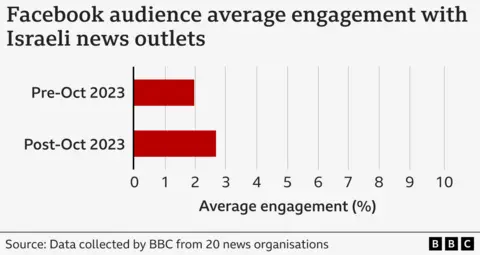
Palestinians and human rights groups have previously accused Meta Failure to manage online activity fairly.
An independent report commissioned by the company in 2021 said this was not intentional but due to a lack of Arabic-speaking experience among moderators. Words and phrases are interpreted as offensive or violent, when in fact they are harmless.
For example, the Arabic phrase “Alhamdulillah,” which means “Praise be to God,” was sometimes automatically translated as “Praise be to God, Palestinian terrorists are fighting for their freedom.”
To see if this explains the decline in engagement with Palestinian media, the BBC conducted the same analysis on the Facebook pages of 30 prominent Arabic-language news sources based elsewhere, such as Sky News Arabia and Al Jazeera.
However, these pages saw an average increase in engagement of almost 100%.
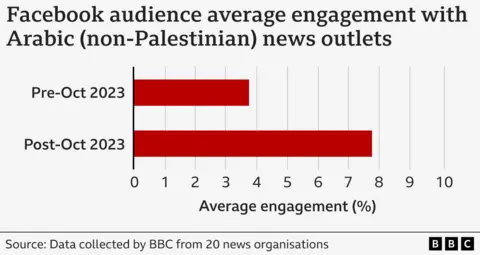
In response to our research, Meta noted that it did not hide the “temporary measures related to products and policies” taken in October 2023.
She said she faced a challenge in balancing the right to freedom of expression with the fact that Hamas is subject to US sanctions and classified as a dangerous organization under Meta's own policies.
The tech giant also said that pages that post exclusively about the war were likely to be affected by engagement.
A company spokesperson said: “We acknowledge that we make mistakes, but any suggestion that we are intentionally suppressing a particular voice is unequivocally false.”
Leaked Instagram documents
The BBC also spoke to five former and current Meta employees about the impact they say their company's policies have had on individual Palestinian users.
One person, speaking anonymously, shared leaked internal documents about a change made to the Instagram algorithm, which resulted in tougher moderation of Palestinians commenting on Instagram posts.
He added: “Within a week of the Hamas attack, the law was fundamentally changed, making it more aggressive towards the Palestinian people.”
Internal messages show that an engineer raised concerns about the order, concerned that it might “introduce a new bias into the system against Palestinian users.”
Meta confirmed that she had taken this action, but said that it was necessary to respond to what she called “the rise in hate content” coming from the Palestinian territories.
She said that the political changes implemented at the beginning of the war between Israel and Gaza have now been reversed, but she did not say when this happened.
At least 137 Palestinian journalists have reportedly been killed in Gaza since the beginning of the conflict, but a small number have continued to fight despite the risks.
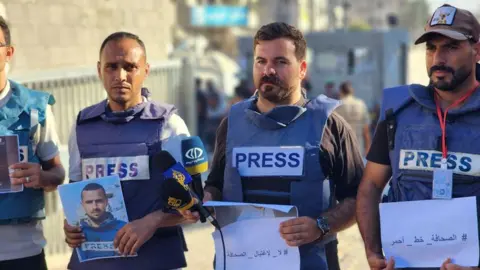 Getty Images
Getty Images“A lot of information cannot be published because it is too graphic,” says Omar Al-Qattaa, one of the few photojournalists. “For example, if the (Israeli) army committed a massacre and we filmed it, the video would not spread.” Who chose to remain in northern Gaza.
He adds, “But despite the challenges, risks, and content bans, we must continue to share Palestinian content.”
Additional reporting by Rihab Ismail and Natalie Marzouki






